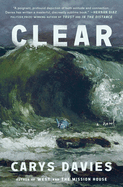
Set during the Scottish Clearances of the 1840s, Clear, the hauntingly austere novel by Edinburgh-based author Carys Davies (West; The Redemption of Galen Pike), is elegant in its brevity and yet bathes readers in the vastness of its scope. Clear centers on three characters: Ivar, the last remaining occupant of an island off the coast of Scotland; John Ferguson, a minister who is sent to evict him so that the land may be given over to sheep pasture; and Mary Ferguson, John's practical and resilient wife, who remains at home but also plays an important part in the two men's interactions. Things get complicated when John arrives at the island and is injured, thus requiring the help of the man he was sent to displace. As they spend more time together, John starts to question the morality of his task while, at the same time, being faced with the reality of the economic situation that made taking this on necessary. As he tells himself, "The important thing was not to become dispirited--the important thing was to remember that this was a job, an errand, a means to a very important end."
What follows is a taut, tender, and surprising examination of belonging, solitude, relationships, and communication. The interplay between characters is vivid and memorable. Mary has a profound influence on events on the island and the momentum of the story. Through a series of flashbacks, readers witness the depth of her marriage--she "had never expected to meet anyone she would love as much as she loved John." She is also one of the few characters opposed to the "vast emptying out" of the Clearances. Ivar and John do not speak the same language, and some of the most intriguing and captivating moments of the novel are the scenes in which the two men attempt to learn each other's words and communicate: "After a few days though, they started to be able to speak to each other in a simple, noun-filled way.... The box in which he kept his bait was his kilpek. The fish liver puddings he made were krus; the porridge was lik."
Although the story takes place during the Scottish Clearances, a time when entire communities of rural poor were driven off their land through a system of forced evictions done largely by Scottish landowners--"the big broom [that had been busy] all over Scotland"--the themes of displacement, classism, and nationalism are still very relevant today. Davies lives in Edinburgh, and her love of the land, first-hand observations of the long-lasting consequences of the Scottish Clearances, and fascination with the lost language spoken by Ivar are apparent on every page. Her writing deftly captures this specific and intriguing period of history while still seeming eternal and timeless. Much of that has to do with her character development. Davies crafts the three protagonists with immense care, subtlety, and compassion, and their inner worlds invite as much exploration as the rugged beauty of the terrain in which they find themselves.
Davies spends time exploring the difference between solitude and loneliness. Before the arrival of John, Ivar was alone, and had gotten used to it. However, as the two men spend more time together, Ivar becomes conscious of a restlessness taking over all of his day-to-day tasks and activities. Whether he is fishing or gathering wool, pulling up weeds or collecting seaweed, he finds himself working with a "restless haste, anxious to get back, afraid that while he was gone, John Ferguson would leave, or be snatched away, or turn out never to have existed in the first place." Ivar ponders one night, "Before the arrival of John Ferguson he'd never really thought of the things he saw or heard or touched or felt as words." And now, he is filled with anticipation and excitement about the way the two columns of words--words in his language and in John's--link the men and their lives. Even the simplest words, shared with his newfound companion--milk, halibut, house--renew and rekindle a sense of self and belonging that Ivar did not realize he had been missing for so long.
The setting of Clear, on a misty and mysterious northern island, further imbues the events of the story with an almost mythical, dream-like quality that, like "the sea restless and unruly and wild," heightens the emotional stakes of each scene. Davies's spare and refined prose perfectly complements this enigmatic, tumultuous landscape, with its mist that "fell like a cloak onto the island's shoulders" and "days when the sun was only visible as a luminous spot behind the clouds."
More than anything, Clear is a story of connection, full of nuance and rich in layers--the connection between people in a relationship, between strangers, between humans and the land, and between completely different languages. The astute way in which Davies examines these connections will enchant and captivate readers for years after reading the final words. With each rereading, Clear reveals new and astounding insights. --Grace Rajendran

